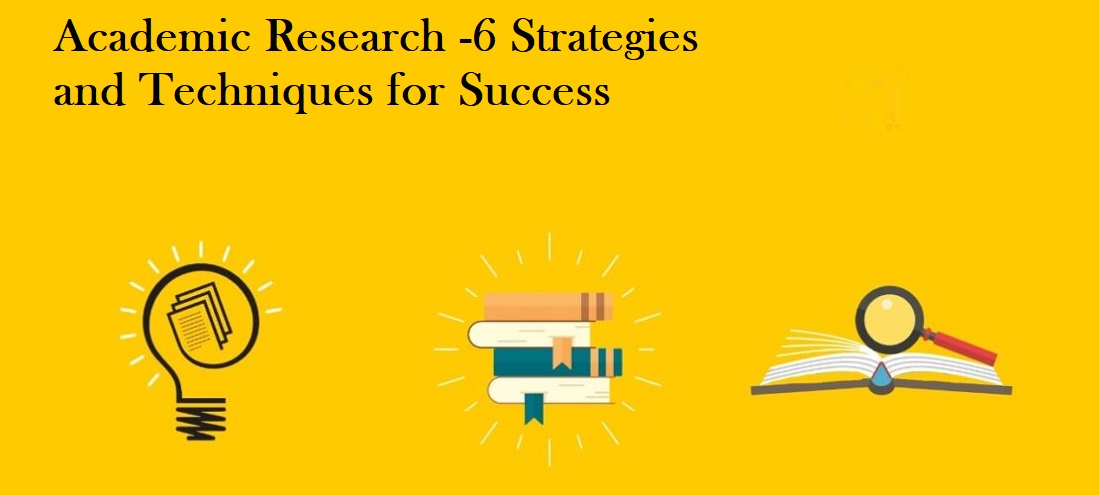- June 20, 2023
- Posted by: Thesis Africa
- Category: Thesis Dissertation Guide

Academic Research -6 Strategies and Techniques for Success
Introduction
Are you an aspiring academic researcher who wants to take your research skills to the next level? Or a seasoned academic who wants to sharpen your research prowess? If so, you have come to the right place.
Academic research is the backbone of academic writing, and the importance of conducting research cannot be overstated. Research helps to generate new knowledge, solve problems, and validate or refute existing theories. It forms the basis of academic discourse, and its findings can inform policy, practice, and decision-making.
Academic research is the systematic investigation of a particular topic or issue using established methods, frameworks, and principles of inquiry. It involves the collection and analysis of data, interpretation of results, and presentation of findings clearly and concisely.
In this blog post, we will explore the strategies and techniques you can use to master the art of academic research. We will cover topics such as formulating research questions, conducting a literature review, choosing appropriate research methods, data analysis, and presenting research findings.
Whether you are a novice researcher or an experienced academic, the strategies and techniques discussed in this blog post will help you to conduct high-quality academic research that contributes to the body of knowledge in your field. So, let’s get started!

Setting Clear Research Goals: Strategies and Techniques for Success
To conduct successful academic research, one of the most important things you must do is set clear research goals. Defining your research objectives and questions will not only help you stay focused and on track, but it will also ensure that you conduct high-quality research that contributes to the knowledge in your field.
The importance of setting clear research goals cannot be overstated. Without clear goals, you risk conducting research that lacks focus, is irrelevant, or fails to answer the research questions. This can lead to wasted time, resources, and effort, and even worse, damage your research reputation.
Here are some tips for defining your research objectives and questions:
- Identify your research problem: What problem or issue do you want to address in your research?
- Conduct a literature review: What research has already been conducted on the topic? What gaps in knowledge exist?
- Define your research objectives: What do you want to achieve through your research? What outcomes do you hope to produce?
- Formulate research questions: What questions do you want to answer through your research? What specific information do you need to collect to answer these questions?
Some examples of well-defined research questions are:
- How does parental involvement impact student achievement in low-income schools?
- What factors contribute to job satisfaction among healthcare workers in rural areas?
- What are the effects of social media on body image and self-esteem among adolescent girls?
By setting clear research goals, you can conduct high-quality research that is relevant, informative, and valuable to the academic community. So, take the time to define your research objectives and questions, and start your research journey on the right foot.
Conducting a Comprehensive Literature Review
In academic research, a comprehensive literature review is an essential step that helps to inform the research design, identify gaps in knowledge, and provide a context for the research. A literature review is a critical evaluation of existing literature on a specific topic or research question, and it forms the basis of any successful research project.
The importance of a literature review in academic research cannot be overstated. It helps to provide a comprehensive understanding of your field’s current state of knowledge, identify key debates and controversies, and highlight areas where further research is needed.
Here are some tips for finding relevant sources and conducting a comprehensive literature review:
- Identify relevant databases: Determine which databases are relevant to your research topic, such as JSTOR, Google Scholar, and PubMed.
- Use relevant keywords: Choose keywords that accurately reflect your research topic and use them to search the relevant databases.
- Evaluate sources: Evaluate the quality and relevance of each source by considering factors such as the author’s credentials, the publication date, and the publisher’s credibility.
- Organize your research: Use tools such as reference management software, like Mendeley or Zotero, to keep track of your sources and organize your research.
A comprehensive literature review ensures that your research is relevant, informative, and valuable to the academic community. It can help you to identify the gaps in knowledge and build on existing research to contribute new insights to your field. So, take the time to conduct a thorough literature review, and lay a strong foundation for your research project.
Designing a Research Methodology
In academic research, a research methodology is a blueprint for the entire research project. It provides a framework for collecting and analyzing data and ensures the research is conducted systematically and rigorously. The importance of a research methodology in academic research cannot be overstated. It helps ensure the research is valid, reliable, and credible.
Here are some tips for choosing the right data collection and analysis techniques and designing an effective research methodology:
- Choose the right data collection techniques: Determine the most appropriate methods for collecting data, such as surveys, interviews, or observations.
- Select the right data analysis techniques: Choose the most suitable data analysis techniques, such as descriptive statistics, inferential statistics, or content analysis.
- Decide on the research approach: Choose between qualitative and quantitative research methods, depending on the research question and the type of data you need to collect.
- Consider the ethical implications: Ensure your research methodology adheres to ethical guidelines and does not harm participants or violate their rights.
Examples of different research methodologies include case studies, experiments, surveys, and ethnographic research. Each methodology has its advantages and disadvantages, and the choice of methodology will depend on the research question, the type of data, and the research context.
By designing a research methodology that is appropriate for your research question and context, you can ensure that your research is valid, reliable, and credible. So, take the time to carefully choose the data collection and analysis techniques, select the most suitable research approach, and consider the ethical implications of your research.
Managing Your Time and Resources
In academic research, time management is critical to the success of any project. The research process can be time-consuming and challenging; without effective time management, it’s easy to get overwhelmed and fall behind. Effective time management helps you to stay on track, meet deadlines, and produce high-quality research.
Here are some tips for effective planning and execution of your academic research:
- Set realistic goals: Break down your research project into smaller, manageable goals and set deadlines for each.
- Create a schedule: Create a detailed schedule that outlines the specific tasks and activities that must be completed at each research project stage.
- Prioritize your tasks: Prioritize your tasks according to their level of importance and deadline.
- Take regular breaks: Regular breaks can help improve productivity and reduce stress.
Tools for managing your time and resources include project management software such as Trello or Asana, citation management software such as EndNote or RefWorks, and time tracking apps such as RescueTime or Toggl.
By managing your time and resources effectively, you can ensure that your research project stays on track and that you produce high-quality research that contributes to the knowledge in your field. So, take the time to set realistic goals, create a schedule, prioritize your tasks, and use tools that help you manage your time and resources effectively.
Writing and Presenting Your Findings
Effective writing and presentation skills are essential to communicating your research findings to the academic community. It’s not enough to conduct high-quality research; you also need to present your findings in a clear, concise, and compelling manner that engages your audience and showcases the value of your research.
Here are some tips for organizing and structuring your paper and presenting your findings:
- Develop a clear structure: Organize your paper into sections, including an introduction, literature review, methodology, results, and conclusion.
- Use clear and concise language: Use language that is clear, concise, and easy to understand. Avoid jargon and technical language that may confuse your readers.
- Use visual aids: Use visual aids such as graphs, tables, and charts to present your data clearly and compellingly.
- Practice your presentation: Practice your presentation in advance to ensure you are confident and comfortable when presenting your findings.
Examples of effective academic writing and presentation techniques include using active voice, avoiding passive voice, and using transitional words and phrases to guide the reader through your paper.
By developing effective writing and presentation skills, you can effectively communicate your research findings to the academic community and showcase the value of your research. So, take the time to organize and structure your paper effectively, and use visual aids and effective language to present your findings clearly and compellingly.
Conclusion
Effective academic research is critical to advancing knowledge in your field. By mastering the art of academic research, you can ensure that your research is rigorous, relevant, and valuable to the academic community. In this post, we covered the key strategies and techniques for success in academic research, including setting clear research goals, conducting a comprehensive literature review, designing a research methodology, managing your time and resources effectively, and communicating your findings through effective writing and presentation skills.
By applying these strategies, you can identify gaps in knowledge, build on existing research, and contribute new insights to your field. We encourage you to take action and apply the tips and tools outlined in this post to your research. Many resources, such as academic writing courses, online writing communities, and academic research organizations, are available. Remember, mastering the art of academic research is a journey, and by applying the right strategies and techniques, you can make a valuable contribution to your field and the academic community as a whole.


